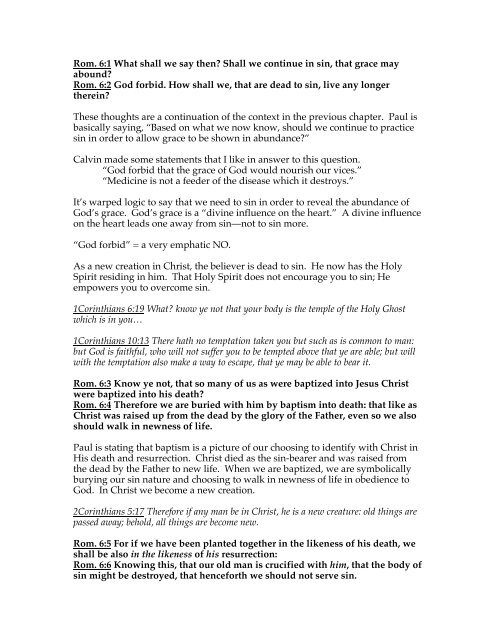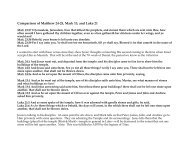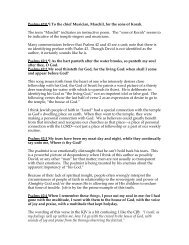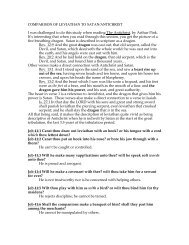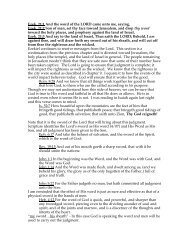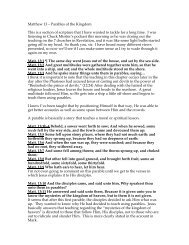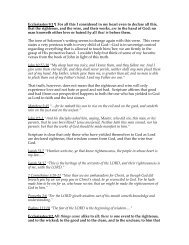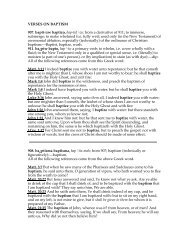Rom. 6:1 What shall we say then? Shall we continue in sin, that ...
Rom. 6:1 What shall we say then? Shall we continue in sin, that ...
Rom. 6:1 What shall we say then? Shall we continue in sin, that ...
You also want an ePaper? Increase the reach of your titles
YUMPU automatically turns print PDFs into web optimized ePapers that Google loves.
<strong>Rom</strong>. 6:1 <strong>What</strong> <strong>shall</strong> <strong>we</strong> <strong>say</strong> <strong>then</strong>? <strong>Shall</strong> <strong>we</strong> <strong>cont<strong>in</strong>ue</strong> <strong>in</strong> s<strong>in</strong>, <strong>that</strong> grace may<br />
abound?<br />
<strong>Rom</strong>. 6:2 God forbid. How <strong>shall</strong> <strong>we</strong>, <strong>that</strong> are dead to s<strong>in</strong>, live any longer<br />
there<strong>in</strong>?<br />
These thoughts are a cont<strong>in</strong>uation of the context <strong>in</strong> the previous chapter. Paul is<br />
basically <strong>say</strong><strong>in</strong>g, “Based on what <strong>we</strong> now know, should <strong>we</strong> <strong>cont<strong>in</strong>ue</strong> to practice<br />
s<strong>in</strong> <strong>in</strong> order to allow grace to be shown <strong>in</strong> abundance?”<br />
Calv<strong>in</strong> made some statements <strong>that</strong> I like <strong>in</strong> ans<strong>we</strong>r to this question.<br />
“God forbid <strong>that</strong> the grace of God would nourish our vices.”<br />
“Medic<strong>in</strong>e is not a feeder of the disease which it destroys.”<br />
It’s warped logic to <strong>say</strong> <strong>that</strong> <strong>we</strong> need to s<strong>in</strong> <strong>in</strong> order to reveal the abundance of<br />
God’s grace. God’s grace is a “div<strong>in</strong>e <strong>in</strong>fluence on the heart.” A div<strong>in</strong>e <strong>in</strong>fluence<br />
on the heart leads one away from s<strong>in</strong>—not to s<strong>in</strong> more.<br />
“God forbid” = a very emphatic NO.<br />
As a new creation <strong>in</strong> Christ, the believer is dead to s<strong>in</strong>. He now has the Holy<br />
Spirit resid<strong>in</strong>g <strong>in</strong> him. That Holy Spirit does not encourage you to s<strong>in</strong>; He<br />
empo<strong>we</strong>rs you to overcome s<strong>in</strong>.<br />
1Cor<strong>in</strong>thians 6:19 <strong>What</strong>? know ye not <strong>that</strong> your body is the temple of the Holy Ghost<br />
which is <strong>in</strong> you…<br />
1Cor<strong>in</strong>thians 10:13 There hath no temptation taken you but such as is common to man:<br />
but God is faithful, who will not suffer you to be tempted above <strong>that</strong> ye are able; but will<br />
with the temptation also make a way to escape, <strong>that</strong> ye may be able to bear it.<br />
<strong>Rom</strong>. 6:3 Know ye not, <strong>that</strong> so many of us as <strong>we</strong>re baptized <strong>in</strong>to Jesus Christ<br />
<strong>we</strong>re baptized <strong>in</strong>to his death?<br />
<strong>Rom</strong>. 6:4 Therefore <strong>we</strong> are buried with him by baptism <strong>in</strong>to death: <strong>that</strong> like as<br />
Christ was raised up from the dead by the glory of the Father, even so <strong>we</strong> also<br />
should walk <strong>in</strong> newness of life.<br />
Paul is stat<strong>in</strong>g <strong>that</strong> baptism is a picture of our choos<strong>in</strong>g to identify with Christ <strong>in</strong><br />
His death and resurrection. Christ died as the s<strong>in</strong>-bearer and was raised from<br />
the dead by the Father to new life. When <strong>we</strong> are baptized, <strong>we</strong> are symbolically<br />
bury<strong>in</strong>g our s<strong>in</strong> nature and choos<strong>in</strong>g to walk <strong>in</strong> newness of life <strong>in</strong> obedience to<br />
God. In Christ <strong>we</strong> become a new creation.<br />
2Cor<strong>in</strong>thians 5:17 Therefore if any man be <strong>in</strong> Christ, he is a new creature: old th<strong>in</strong>gs are<br />
passed away; behold, all th<strong>in</strong>gs are become new.<br />
<strong>Rom</strong>. 6:5 For if <strong>we</strong> have been planted together <strong>in</strong> the likeness of his death, <strong>we</strong><br />
<strong>shall</strong> be also <strong>in</strong> the likeness of his resurrection:<br />
<strong>Rom</strong>. 6:6 Know<strong>in</strong>g this, <strong>that</strong> our old man is crucified with him, <strong>that</strong> the body of<br />
s<strong>in</strong> might be destroyed, <strong>that</strong> henceforth <strong>we</strong> should not serve s<strong>in</strong>.
<strong>Rom</strong>. 6:7 For he <strong>that</strong> is dead is freed from s<strong>in</strong>.<br />
“planted together” = buried as one—Greek: closely united to<br />
“destroyed” = rendered useless, make of no effect, abolished<br />
Our position and <strong>in</strong>heritance is <strong>in</strong> Christ. He examples what is true for the<br />
believer. “Our old man” is a reference to the s<strong>in</strong>ful man <strong>we</strong> <strong>we</strong>re before<br />
salvation. Through faith <strong>in</strong> Jesus <strong>we</strong>, <strong>in</strong> essence, crucify/kill <strong>that</strong> old man.<br />
Thought from Chuck Smith: “Crucifixion is a slow and torturous death; the flesh<br />
doesn’t die easily.<br />
As a new creature with new life <strong>in</strong> Christ, represented by His resurrection, <strong>we</strong><br />
are no longer servants to s<strong>in</strong>. Our new position <strong>in</strong> Christ empo<strong>we</strong>rs us through<br />
the Spirit to have the victory over s<strong>in</strong> <strong>in</strong> our lives. We have been freed from s<strong>in</strong><br />
and its po<strong>we</strong>r over us.<br />
John 8:34-36 Jesus ans<strong>we</strong>red them, Verily, verily, I <strong>say</strong> unto you, Whosoever committeth<br />
s<strong>in</strong> is the servant of s<strong>in</strong>. And the servant abideth not <strong>in</strong> the house for ever: but the Son<br />
abideth ever. If the Son therefore <strong>shall</strong> make you free, ye <strong>shall</strong> be free <strong>in</strong>deed.<br />
Galatians 5:24 And they <strong>that</strong> are Christ’s have crucified the flesh with the affections and<br />
lusts.<br />
Galatians 5:1 Stand fast therefore <strong>in</strong> the liberty wherewith Christ hath made us free, and<br />
be not entangled aga<strong>in</strong> with the yoke of bondage.<br />
“freed” = declared just or <strong>in</strong>nocent, righteous (justified—just as if I had never<br />
s<strong>in</strong>ned)<br />
<strong>Rom</strong>. 6:8 Now if <strong>we</strong> be dead with Christ, <strong>we</strong> believe <strong>that</strong> <strong>we</strong> <strong>shall</strong> also live<br />
with him:<br />
<strong>Rom</strong>. 6:9 Know<strong>in</strong>g <strong>that</strong> Christ be<strong>in</strong>g raised from the dead dieth no more; death<br />
hath no more dom<strong>in</strong>ion over him.<br />
Aga<strong>in</strong>, Paul uses logic to make his argument. If you accept <strong>that</strong> you have died<br />
with Christ, it follows <strong>that</strong> <strong>we</strong> <strong>shall</strong> also live with Christ. Christ was raised from<br />
the dead never to die aga<strong>in</strong>; death has no po<strong>we</strong>r over Him. That br<strong>in</strong>gs up a new<br />
argument for the security of the believer as far as I am concerned. If <strong>we</strong> are <strong>in</strong><br />
Christ and death no longer has po<strong>we</strong>r over Him, it no longer has po<strong>we</strong>r over me.<br />
<strong>Rom</strong>. 6:10 For <strong>in</strong> <strong>that</strong> he died, he died unto s<strong>in</strong> once: but <strong>in</strong> <strong>that</strong> he liveth, he<br />
liveth unto God.<br />
“died unto s<strong>in</strong> once” - I th<strong>in</strong>k this phrase is significant especially to the Jewish<br />
believer. The sacrificial system look<strong>in</strong>g forward to Jesus required cont<strong>in</strong>ual<br />
sacrifices to ma<strong>in</strong>ta<strong>in</strong> right stand<strong>in</strong>g with God. Jesus’ sacrifice of Himself was<br />
sufficient for all peoples of all times and will never have to be repeated.
“he liveth unto God” – That seems a strange statement to make about Jesus. He<br />
always lived <strong>in</strong> obedience to and <strong>in</strong> fellowship with God the Father. The<br />
emphasis I th<strong>in</strong>k is on the fact <strong>that</strong> He chose to become my/our s<strong>in</strong> on the cross,<br />
and at <strong>that</strong> time He was forsaken by the Father; He lost fellowship with the<br />
Father for the first and only time ever <strong>in</strong> His existence.<br />
Matthew 27:46 And about the n<strong>in</strong>th hour Jesus cried with a loud voice, <strong>say</strong><strong>in</strong>g, Eli, Eli,<br />
lama sabachthani? <strong>that</strong> is to <strong>say</strong>, My God, my God, why hast thou forsaken me?<br />
As a man, Jesus had to deal with temptation just as <strong>we</strong> as believers do. The<br />
difference is <strong>that</strong> He always lived through the empo<strong>we</strong>rment of the Spirit—just<br />
as <strong>we</strong> are supposed to do.<br />
Hebrews 2:18 For <strong>in</strong> <strong>that</strong> he himself hath suffered be<strong>in</strong>g tempted, he is able to succour<br />
them <strong>that</strong> are tempted.<br />
Hebrews 4:15 For <strong>we</strong> have not an high priest which cannot be touched with the feel<strong>in</strong>g of<br />
our <strong>in</strong>firmities; but was <strong>in</strong> all po<strong>in</strong>ts tempted like as <strong>we</strong> are, yet without s<strong>in</strong>.<br />
<strong>Rom</strong>. 6:11 Likewise reckon ye also yourselves to be dead <strong>in</strong>deed unto s<strong>in</strong>, but<br />
alive unto God through Jesus Christ our Lord.<br />
“reckon” = conclude, reason, th<strong>in</strong>k<br />
We reckon ourselves dead to s<strong>in</strong> when <strong>we</strong> respond to s<strong>in</strong> as a dead man would.<br />
On the other hand, if <strong>we</strong> reckon ourselves “alive unto God through Jesus Christ<br />
our Lord,” <strong>we</strong> should live as Jesus would want us to live. In fact, because <strong>we</strong> are<br />
His temple, His d<strong>we</strong>ll<strong>in</strong>g place, <strong>we</strong> should live just as He would live—make the<br />
choices He would make, do the th<strong>in</strong>gs He would do, <strong>say</strong> the th<strong>in</strong>gs He would<br />
<strong>say</strong>, th<strong>in</strong>k the thoughts He would th<strong>in</strong>k, etc.<br />
Paul expressed this thought to the Galatians as follows:<br />
Galatians 2:20 I am crucified with Christ: nevertheless I live; yet not I, but Christ liveth<br />
<strong>in</strong> me: and the life which I now live <strong>in</strong> the flesh I live by the faith of the Son of God, who<br />
loved me, and gave himself for me.<br />
<strong>Rom</strong>. 6:12 Let not s<strong>in</strong> therefore reign <strong>in</strong> your mortal body, <strong>that</strong> ye should obey<br />
it <strong>in</strong> the lusts thereof.<br />
“mortal body” = the physical body subject to physical death<br />
Paul <strong>cont<strong>in</strong>ue</strong>s to pound home his po<strong>in</strong>t. As believers who have been justified<br />
before God with new life <strong>in</strong> Christ, <strong>we</strong> are no longer slaves to s<strong>in</strong>; and <strong>we</strong> should<br />
not give <strong>in</strong> to the lusts of s<strong>in</strong>. The Greek for lusts is quite enlighten<strong>in</strong>g: “a<br />
long<strong>in</strong>g (especially for what is forbidden).”
I was listen<strong>in</strong>g to John Piper recently, and he presents this verse as describ<strong>in</strong>g<br />
our bodies as a throne <strong>that</strong> s<strong>in</strong> desires to possess. It is our choice as to allow<strong>in</strong>g<br />
s<strong>in</strong> to get victory <strong>in</strong> our life. He also makes the good po<strong>in</strong>t <strong>that</strong> our desires—i.e.,<br />
food, dr<strong>in</strong>k, sex, etc.—aren’t <strong>in</strong>herently bad. They become evil when <strong>we</strong> yield to<br />
their <strong>in</strong>fluence to produce unrighteousness <strong>in</strong> our life.<br />
<strong>Rom</strong>. 6:13 Neither yield ye your members as <strong>in</strong>struments of unrighteousness<br />
unto s<strong>in</strong>: but yield yourselves unto God, as those <strong>that</strong> are alive from the dead,<br />
and your members as <strong>in</strong>struments of righteousness unto God.<br />
We are to be yielded to God as <strong>in</strong>struments of righteousness. This is a choice on<br />
our part. Frankly, the choices <strong>we</strong> make <strong>in</strong>dicate to whom <strong>we</strong> are submitt<strong>in</strong>g as<br />
Lord <strong>in</strong> our life. One of the def<strong>in</strong>itions <strong>in</strong> Webster for yield stood out to me: “to<br />
make over to one who has a claim or right.” S<strong>in</strong> no longer reigns (cf verses 6 & 9)<br />
or has authority over us. Through the empo<strong>we</strong>rment of the Spirit <strong>we</strong> can<br />
overcome s<strong>in</strong>. If <strong>we</strong> yield to s<strong>in</strong> <strong>we</strong> are grant<strong>in</strong>g it a position of authority it no<br />
longer possesses.<br />
I thought it was <strong>in</strong>terest<strong>in</strong>g <strong>that</strong> the Greek for <strong>in</strong>struments <strong>in</strong>dicates an offensive<br />
<strong>we</strong>apon—not a defensive <strong>we</strong>apon. An offensive <strong>we</strong>apon is used to attack and<br />
accomplish the objective of the one possess<strong>in</strong>g it. We are to use our bodies<br />
offensively for the cause of righteousness, to accomplish the purposes of God.<br />
<strong>Rom</strong>. 6:14 For s<strong>in</strong> <strong>shall</strong> not have dom<strong>in</strong>ion over you: for ye are not under the<br />
law, but under grace.<br />
William MacDonald (Believer’s Bible Commentary) made a statement <strong>that</strong> I like<br />
<strong>in</strong> reference to this thought: “The law tells you what to do, but doesn’t give you<br />
the po<strong>we</strong>r to do it. God’s grace enables you to live as an overcomer.”<br />
Another quote I have <strong>in</strong> some personal notes is attributed to Denney – “It is not<br />
restra<strong>in</strong>t, but <strong>in</strong>spiration <strong>that</strong> liberates from s<strong>in</strong>; not Mt. S<strong>in</strong>ai, but Mt. Calvary<br />
which makes sa<strong>in</strong>ts.”<br />
<strong>What</strong> does it mean to be “under the law?” It means <strong>that</strong> you are liv<strong>in</strong>g under a<br />
curse.<br />
Nehemiah 10:29 They clave to their brethren, their nobles, and entered <strong>in</strong>to a curse, and<br />
<strong>in</strong>to an oath, to walk <strong>in</strong> God’s law, which was given by Moses the servant of God, and to<br />
observe and do all the commandments of the LORD our Lord, and his judgments and his<br />
statutes;<br />
Daniel 9:11 Yea, all Israel have transgressed thy law, even by depart<strong>in</strong>g, <strong>that</strong> they might<br />
not obey thy voice; therefore the curse is poured upon us, and the oath <strong>that</strong> is written <strong>in</strong><br />
the law of Moses the servant of God, because <strong>we</strong> have s<strong>in</strong>ned aga<strong>in</strong>st him.<br />
Galatians 3:10 & 13 For as many as are of the works of the law are under the<br />
curse: for it is written, Cursed is every one <strong>that</strong> <strong>cont<strong>in</strong>ue</strong>th not <strong>in</strong> all th<strong>in</strong>gs which are<br />
written <strong>in</strong> the book of the law to do them….Christ hath redeemed us from the curse of
the law, be<strong>in</strong>g made a curse for us: for it is written, Cursed is every one <strong>that</strong> hangeth on<br />
a tree…<br />
That curse is spelled out specifically for the people of Israel <strong>in</strong> Leviticus 26 and <strong>in</strong><br />
Deuteronomy.<br />
Deuteronomy 11:26-28 Behold, I set before you this day a bless<strong>in</strong>g and a curse; A<br />
bless<strong>in</strong>g, if ye obey the commandments of the LORD your God, which I command you<br />
this day: And a curse, if ye will not obey the commandments of the LORD your God….<br />
The commandments of God = the law.<br />
<strong>What</strong> does it mean to be “under grace?” It means to be under div<strong>in</strong>e <strong>in</strong>fluence,<br />
to have the empo<strong>we</strong>rment and guidance of the Holy Spirit. Webster def<strong>in</strong>es the<br />
grace of God as:<br />
(Theol.) The div<strong>in</strong>e favor toward man; the mercy of God, as dist<strong>in</strong>guished<br />
from His justice; also, any benefits His mercy imparts; div<strong>in</strong>e love or<br />
pardon; a state of acceptance with God; enjoyment of the div<strong>in</strong>e favor.<br />
Paul adds to the ans<strong>we</strong>r <strong>in</strong> his letter to the Cor<strong>in</strong>thians.<br />
2Cor<strong>in</strong>thians 9:8 And God is able to make all grace abound toward you; <strong>that</strong> ye, always<br />
hav<strong>in</strong>g all sufficiency <strong>in</strong> all th<strong>in</strong>gs, may abound to every good work….<br />
And to the Ephesians:<br />
Ephesians 1:6-7 To the praise of the glory of his grace, where<strong>in</strong> he hath made us accepted<br />
<strong>in</strong> the beloved. In whom <strong>we</strong> have redemption through his blood, the forgiveness of<br />
s<strong>in</strong>s, accord<strong>in</strong>g to the riches of his grace…<br />
Ephesians 2:7 That <strong>in</strong> the ages to come he might shew the exceed<strong>in</strong>g riches of his grace <strong>in</strong><br />
his k<strong>in</strong>dness toward us through Christ Jesus.<br />
And to the Thessalonians:<br />
2Thessalonians 2:16 Now our Lord Jesus Christ himself, and God, even our Father,<br />
which hath loved us, and hath given us everlast<strong>in</strong>g consolation and good hope<br />
through grace….<br />
Spurgeon gives food for thought on this section: “God has so changed your<br />
nature by His grace <strong>that</strong> when you s<strong>in</strong>, you <strong>shall</strong> be like a fish on dry land; you<br />
<strong>shall</strong> be out of your element and long to get <strong>in</strong>to a right state aga<strong>in</strong>.”<br />
<strong>Rom</strong>. 6:15 <strong>What</strong> <strong>then</strong>? <strong>shall</strong> <strong>we</strong> s<strong>in</strong>, because <strong>we</strong> are not under the law, but<br />
under grace? God forbid.<br />
Paul doesn’t let up; he <strong>cont<strong>in</strong>ue</strong>s to hammer home his po<strong>in</strong>t. Be<strong>in</strong>g under grace<br />
does not give us a license to s<strong>in</strong>! The grace of God doesn’t lead us to s<strong>in</strong>; it leads<br />
us to live godly lives.
Titus 2:11-12 For the grace of God <strong>that</strong> br<strong>in</strong>geth salvation hath appeared to all men,<br />
Teach<strong>in</strong>g us <strong>that</strong>, deny<strong>in</strong>g ungodl<strong>in</strong>ess and worldly lusts, <strong>we</strong> should live soberly,<br />
righteously, and godly, <strong>in</strong> this present world…<br />
<strong>Rom</strong>. 6:16 Know ye not, <strong>that</strong> to whom ye yield yourselves servants to obey, his<br />
servants ye are to whom ye obey; whether of s<strong>in</strong> unto death, or of obedience<br />
unto righteousness?<br />
I am rem<strong>in</strong>ded of the old <strong>say</strong><strong>in</strong>g, “Actions speak louder than words.” Your<br />
actions reveal whom you consider to be your master. If you yield to s<strong>in</strong>, your<br />
master is s<strong>in</strong>; if you yield to obedience <strong>in</strong> righteousness, your master is God.<br />
Choos<strong>in</strong>g s<strong>in</strong> as your master results <strong>in</strong> death; choos<strong>in</strong>g God as your master<br />
results <strong>in</strong> eternal life.<br />
James 1:15 Then when lust hath conceived, it br<strong>in</strong>geth forth s<strong>in</strong>: and s<strong>in</strong>, when it is<br />
f<strong>in</strong>ished, br<strong>in</strong>geth forth death.<br />
1John 2:17 And the world passeth away, and the lust thereof: but he <strong>that</strong> doeth the will of<br />
God abideth for ever.<br />
<strong>Rom</strong>. 6:17 But God be thanked, <strong>that</strong> ye <strong>we</strong>re the servants of s<strong>in</strong>, but ye have<br />
obeyed from the heart <strong>that</strong> form of doctr<strong>in</strong>e which was delivered you.<br />
<strong>Rom</strong>. 6:18 Be<strong>in</strong>g <strong>then</strong> made free from s<strong>in</strong>, ye became the servants of<br />
righteousness.<br />
Paul gives thanks to God <strong>that</strong> the church at <strong>Rom</strong>e had chosen to reject s<strong>in</strong> as their<br />
master and to become servants of righteousness. When this body of believers<br />
was taught the truth of the gospel, they responded from the heart, and their<br />
actions, their way of life proved it. This is really the truth <strong>that</strong> is at the heart of<br />
the epistle of James.<br />
James 2:17-22 Even so faith, if it hath not works, is dead, be<strong>in</strong>g alone. Yea, a man<br />
may <strong>say</strong>, Thou hast faith, and I have works: shew me thy faith without thy works, and I<br />
will shew thee my faith by my works. Thou believest <strong>that</strong> there is one God; thou doest<br />
<strong>we</strong>ll: the devils also believe, and tremble. But wilt thou know, O va<strong>in</strong> man, <strong>that</strong> faith<br />
without works is dead? Was not Abraham our father justified by works, when he had<br />
offered Isaac his son upon the altar? Seest thou how faith wrought with his works, and by<br />
works was faith made perfect?<br />
A true servant of God will become a servant of righteousness. John Piper stated<br />
it this way: “Justification by faith does not produce Christians who are cavalier<br />
about s<strong>in</strong>. It makes us dead set aga<strong>in</strong>st s<strong>in</strong> <strong>in</strong> our own lives.”<br />
<strong>Rom</strong>. 6:19 I speak after the manner of men because of the <strong>in</strong>firmity of your<br />
flesh: for as ye have yielded your members servants to uncleanness and to<br />
<strong>in</strong>iquity unto <strong>in</strong>iquity; even so now yield your members servants to<br />
righteousness unto hol<strong>in</strong>ess.
“after the manner of men” – <strong>in</strong> a way <strong>that</strong> is easy to understand<br />
Paul is us<strong>in</strong>g the language of slave and master to expla<strong>in</strong> the truth; truth <strong>that</strong> is<br />
illustrated by th<strong>in</strong>gs <strong>that</strong> are a normal part of our life is sometimes easier to<br />
understand.<br />
“<strong>in</strong>firmity” = <strong>we</strong>akness, frailty, feebleness of m<strong>in</strong>d or body<br />
Hav<strong>in</strong>g served s<strong>in</strong> for so long, it takes time to develop spiritual maturity and<br />
understand<strong>in</strong>g. Regard<strong>in</strong>g the m<strong>in</strong>d, Paul doesn’t want to speak assum<strong>in</strong>g<br />
understand<strong>in</strong>g they did not possess. He wants to present the truth clearly.<br />
Regard<strong>in</strong>g the body, Paul knows <strong>that</strong> a past lifestyle <strong>that</strong> has catered to the flesh<br />
causes great struggle <strong>in</strong> the life of the believer. He addresses <strong>that</strong> very struggle<br />
<strong>in</strong> the next chapter.<br />
“as…….even so” = a comparison of time past to the present<br />
“uncleanness” = impurity (physically or morally)<br />
“<strong>in</strong>iquity” = lawlessness, transgression of law, wickedness<br />
Paul is stat<strong>in</strong>g <strong>that</strong> <strong>in</strong> the past, before accept<strong>in</strong>g Jesus as Savior, these people had<br />
used their bodies <strong>in</strong> acts of impurity and wickedness <strong>that</strong> just led them <strong>in</strong>to<br />
greater s<strong>in</strong>; they had yielded to s<strong>in</strong> as the master <strong>in</strong> their life. Paul is encourag<strong>in</strong>g<br />
them to now make their bodies “servants to righteousness unto hol<strong>in</strong>ess.” He<br />
will expand on this thought <strong>in</strong> chapter 12.<br />
<strong>Rom</strong>. 6:20 For when ye <strong>we</strong>re the servants of s<strong>in</strong>, ye <strong>we</strong>re free from<br />
righteousness.<br />
This verse and verse 18 are like opposite sides of the same co<strong>in</strong>.<br />
Freedom from s<strong>in</strong> = servant of righteousness<br />
Servant of s<strong>in</strong> = free from righteousness<br />
<strong>Rom</strong>. 6:21 <strong>What</strong> fruit had ye <strong>then</strong> <strong>in</strong> those th<strong>in</strong>gs whereof ye are now ashamed?<br />
for the end of those th<strong>in</strong>gs is death.<br />
<strong>Rom</strong>. 6:22 But now be<strong>in</strong>g made free from s<strong>in</strong>, and become servants to God, ye<br />
have your fruit unto hol<strong>in</strong>ess, and the end everlast<strong>in</strong>g life.<br />
S<strong>in</strong>ners aren’t concerned with do<strong>in</strong>g what is right; they are basically concerned<br />
with gratify<strong>in</strong>g the flesh. Shame is the result of realiz<strong>in</strong>g how <strong>we</strong> have acted as<br />
servants of s<strong>in</strong>. The believer has come to the po<strong>in</strong>t of realiz<strong>in</strong>g <strong>that</strong> the penalty of<br />
s<strong>in</strong> is death, and he wants no part of it. He has chosen to become a servant of<br />
God and be set free from s<strong>in</strong>. His life now reflects actions <strong>that</strong> cause him no<br />
shame. He is produc<strong>in</strong>g “fruit unto hol<strong>in</strong>ess” and can look forward to<br />
“everlast<strong>in</strong>g life.”<br />
<strong>What</strong> is “fruit unto hol<strong>in</strong>ess?”
Galatians 5:22-23 But the fruit of the Spirit is love, joy, peace, longsuffer<strong>in</strong>g, gentleness,<br />
goodness, faith, Meekness, temperance….<br />
Ephesians 5:9 (For the fruit of the Spirit is <strong>in</strong> all goodness and righteousness and truth;)<br />
Hebrews 13:15 By him therefore let us offer the sacrifice of praise to God cont<strong>in</strong>ually, <strong>that</strong><br />
is, the fruit of our lips giv<strong>in</strong>g thanks to his name.<br />
This is the process of sanctification—becom<strong>in</strong>g more like Jesus, more holy. This<br />
is a work of the Holy Spirit <strong>in</strong> the life of the believer.<br />
<strong>Rom</strong>. 6:23 For the wages of s<strong>in</strong> is death; but the gift of God is eternal life<br />
through Jesus Christ our Lord.<br />
When <strong>we</strong> speak of s<strong>in</strong> result<strong>in</strong>g <strong>in</strong> death, it is more than just the death of the<br />
physical body; it <strong>in</strong>cludes the separation of your be<strong>in</strong>g from the presence of God<br />
forever.<br />
Eternal life is not just liv<strong>in</strong>g forever; it’s liv<strong>in</strong>g forever <strong>in</strong> the presence of God and<br />
experienc<strong>in</strong>g all <strong>that</strong> is holy and righteous <strong>that</strong> is associated with His presence.<br />
There are only two options—death and life.<br />
Death is what you earn by yield<strong>in</strong>g to s<strong>in</strong> as your master.<br />
Eternal life can only be atta<strong>in</strong>ed by accept<strong>in</strong>g God’s gift <strong>that</strong> was made possible<br />
through Jesus Christ our Lord; you can’t earn it.<br />
Ephesians 2:8-9 For by grace are ye saved through faith; and <strong>that</strong> not of yourselves: it is<br />
the gift of God: Not of works, lest any man should boast.<br />
Thought from Chuck Smith: “Death, s<strong>in</strong> and the flesh are always related. Spirit,<br />
righteousness and life are always related. This is God’s orda<strong>in</strong>ed order.”<br />
Aga<strong>in</strong>, I thought John Piper expressed it <strong>we</strong>ll. (My paraphras<strong>in</strong>g)<br />
S<strong>in</strong> and God = slavemasters<br />
S<strong>in</strong> pays wages <strong>that</strong> are deserved—earned.<br />
God gives a gift <strong>that</strong> is undeserved—grace/mercy.<br />
Wages deplete life (your time, effort, etc.) and have no eternal benefit. God’s gift<br />
will allow us to experience the fullness of His love and bless<strong>in</strong>g for time without<br />
end.


